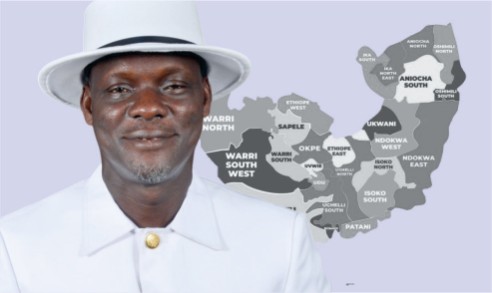GREEN ECONOMY: With Planting of 300 Trees, Okerenkoko Sets the Pace for Delta Riverine Communities
 (1) (1) (1) (1)_1693472642.jpg)
For most inhabitants of riverine settlements in the Niger Delta region, while their expectations of development needs are hinged on physical infrastructures such as access to potable water, electricity, schools, healthcare, roads, jetties, bridges among others, the planting of trees is certainly not one of them. And so it comes as a surprise on the recent initiative of tree planting embarked upon by the Hon. (Dr.) Shadrack Otuaro-led executives of Okerenkoko Federated Community (OFC) in Gbaramatu Kingdom, Warri South-West area of Delta State.
Among the objectives of the tree planting campaign is its primary health benefits as well as its secondary underlying strategy to attract investment to the community which happens to be the hometown of a former deputy governor of Delta State, His Excellency Dcn. (Barr.) Kingsley Burutu Otuaro, and the permanent site for the Nigeria Maritime University (NMU).
 (1) (1) (1)_1693472556.jpg)
The flagging-off of the tree planting campaign on Sunday, August 27, 2023, which is the phase one of the community's beautification project, will end with the planting of all 300 stem trees in the community, which are all expected to begin taking shape, in terms of growth, in a year and a half.
But despite the benefits the project will attract to the community in the long term, there are still those who fail to grasp these economic and health benefits to the growth of the community. But is tree planting a new phenomenon? Definitely not! If there is any location that is best for it, the riverine areas should be one of them. And here are the reasons why.
By their location close to the Atlantic Ocean, most Niger Delta coastal communities are more prone to wind storm which could cause havoc by its destruction of properties in the absence of a defense mechanism, one of which is trees. Sadly, the felling of trees for domestic use such as in generating heat (firewood), building houses, and other wood-related products, has led to deforestation that leaves most affected communities exposed and at the mercy of wind storm. The lack of trees to act as a buffer against this wind storm means that investments in such a place is at the risk of loss from damage by wind storm.
 (1) (1) (1)_1693472608.jpg)
Secondly, manufacturing and industrial activities, particularly in mining or oil exploration which is common in oil-producing riverine terrains, lead to the release of gases or emissions into the environment. For example, gas flared is an environmental pollution mechanism. These greenhouse gas emissions blanket the Earth, trap the sun’s heat, and cause global warming and climate change overtime. This has led to most present-day inhabitants of riverine communities experiencing unnecessary heat wave as against what was experienced in the days of their ancestors. Moreover, water levels are increasing resulting in loss of coastal lands.
Moreover, when trees are cut down, they too release the carbon they have been storing. Since forests absorb carbon dioxide, destroying them also limits nature’s ability to keep emissions out of the atmosphere. So, the more trees that are planted or left standing, the lower the carbon component in the environment and the more fresher the air in the environment will be. This will lead to healthy living as pollutants in the atmosphere are reduced to a large extent. The impact of soil erosion will also be reduced as the roots of trees help hold soil together.
Thirdly, the area of beautification of the environment by the presence of trees is not an end in itself, but one that is geared towards attracting investments. These investment could come in the form of tourism to the community's shores because of the attraction of its natural environment. And the more people traffic to such a community, the more the investment opportunities.
 (1) (1) (1)_1693472631.jpg)
On an international level, tree planting also enhances Nigeria's carbon sink as part of the country’s efforts to implement the Paris climate change agreement, a legally binding international treaty on climate change adopted by 196 Parties at the United Nations Climate Change Conference (COP21) in Paris, France, on 12 December 2015, and entered into force on 4 November 2016. The Paris Agreement is a landmark in the multilateral climate change process because, for the first time, a binding agreement brings all nations together to combat climate change and adapt to its effects.
According to a New 2023 World Data on Tree Planting Statistics, with climate change taking its toll on the world and deforestation being highly on the rise, in 2021 alone, a record 1.83 billion trees were planted worldwide. China sits at the top, with the number of trees they planted in 2021 standing at nearly 2.5 billion trees. Nevertheless, this number is set to increase massively since the country announced its plan to plant at least 36,000 square kilometers of trees each year up to 2025.
It is said that the only thing constant in life is change. But one change that comes with adverse effects is climate change and global warming. We therefore commend the executives of OFC for thinking out of the box by embarking on this laudable project. And we hope other coastal communities will tow the same path taken by OFC. While most coastal or riverine communities are indeed lacking vital infrastructures despite situated in an oil region, nonetheless the need to safeguard the environment is a necessary step that should be taken and supported by all.
#penglobalreport #Okerenkoko #treeplanting #Gbaramatu



